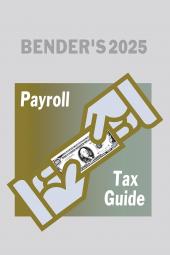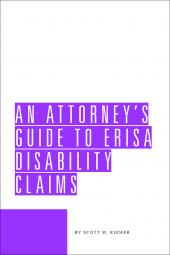An Attorney's Guide to ERISA Disability Claims
Select a format
 International Order Inquiry
International Order Inquiry
Select subscription type
Terms & conditions
Subscribers receive the product(s) listed on the Order Form and any Updates made available during the annual subscription period. Shipping and handling fees are not included in the annual price.
Subscribers are advised of the number of Updates that were made to the particular publication the prior year. The number of Updates may vary due to developments in the law and other publishing issues, but subscribers may use this as a rough estimate of future shipments. Subscribers may call Customer Support at 800-833-9844 for additional information.
Subscribers may cancel this subscription by: calling Customer Support at 800-833-9844; emailing customer.support@lexisnexis.com; or returning the invoice marked "CANCEL".
If subscribers cancel within 30 days after the product is ordered or received and return the product at their expense, then they will receive a full credit of the price for the annual subscription.
If subscribers cancel between 31 and 60 days after the invoice date and return the product at their expense, then they will receive a 5/6th credit of the price for the annual subscription. No credit will be given for cancellations more than 60 days after the invoice date. To receive any credit, subscriber must return all product(s) shipped during the year at their expense within the applicable cancellation period listed above.
The total price includes the product(s) listed in the Order Form and any Updates for a limited period (minimum period of 30 days) after the order is placed ("Order Window"). Shipping and handling fees are not included in the grand total price.
All shipments may be returned, at subscribers' expense, for full credit of the Price within 30 days of receipt.
Shipments may not be returned, and no credits will be issued, more than 30 days after receipt.
After the Order Window, subscribers will receive notice of Updates along with the then-current grand total price and order process as Updates become available. Subscribers will only be shipped those Updates they specifically request.
Product description
View a sample of this title using the ReadNow feature
An Attorney's Guide to ERISA Disability Claims is an essential resource that gives you the specialized knowledge you need to thoroughly prepare ERISA disability claims through both the initial application process and the insurance company's appeal process.
Disability insurers scrutinize claims for any shred of evidence to support a decision that the insured can still perform her occupation. Sometimes just a line or two in the doctor's treatment notes or a minute on a surveillance video is enough. In assessing an occupation's requirements, insurers routinely ignore significant demands, such as travel, long hours, high stress, and quick thinking. This comprehensive guide tells you how to anticipate and respond to these and similar (sometimes outrageous) insurer tactics.
The surest way to resolve your client's ERISA disability claim favorably without litigation is to follow Scott Riemer's guidance. Prepare your client's application and appeal as though you expect litigation to be necessary. When insurers know you are ready for court, they are more likely to pay the claim and save litigation for someone else's client. If you do need to litigate, you will be ready.
Filled with practical strategies, and helpful forms and templates, this guide teaches you how to assemble a compelling case so that your client meets the policy's standard of disability. You will learn:
• How to guide your client, your client's doctor, and your client's employer to avoid traps when completing the claim application forms.
• How to prove your client is disabled.
• How insurers cherry pick doctors' treatment notes and what to do about it.
• What to include in a Residual Functional Capacity Questionnaire.
• What to ask a doctor to include in a narrative report.
• How to prep your client for an insurer interview.
• How to handle a claim when the policy's occupational standard shifts from "own occupation" to "any occupation."
• What information to gather for the client's vocational affidavit.
• What actual demands of your client's occupation insurers' will overlook.
• How to get your client's claim file and what to look for when you get it.
• How to analyze the denial letter so that you can respond to all of the insurer's concerns.
• When to send your client for a functional capacity evaluation and how to overcome an unfavorable one.
• What's required for valid neuropsychological testing.
• When to get a vocational expert evaluation and what information is in one.
• How to discredit an insurer's surveillance videotape of your client.
• 15 arguments you can make to the insurer for reversing its original denial.
Additional forms materials are available from James Publishing; access to those materials can be requested directly from James by following guidelines provided within the eBook or emailing forms@jamespublishing.com.
eBooks, CDs, downloadable content, and software purchases are noncancelable, nonrefundable and nonreturnable. Click here for more information about LexisNexis eBooks. The eBook versions of this title may feature links to Lexis+® for further legal research options. A valid subscription to Lexis+® is required to access this content.
Table of contents
Strategy
Applying for Benefits
Proving Disability
Appealing a Denial or Discontinuation
Requesting the Post Appeal Claim File
Additional Appeals
Appendix - Sample Documents
Related products
-
New!
 California Corporations Code and Commercial Code with Securities Rules and ReleasesNew!Estimated: December 18, 2024$239.00
California Corporations Code and Commercial Code with Securities Rules and ReleasesNew!Estimated: December 18, 2024$239.00 -
New!Preorder
 Bender's Payroll Tax GuideNew!Estimated: December 27, 2024$883.00
Bender's Payroll Tax GuideNew!Estimated: December 27, 2024$883.00 -
New!Preorder
 Deering's California Desktop Code Set SoftboundNew!Estimated: December 30, 2024$636.00
Deering's California Desktop Code Set SoftboundNew!Estimated: December 30, 2024$636.00
 Lexis Nexis
Lexis Nexis 